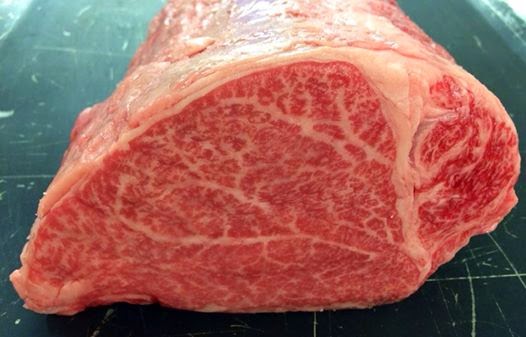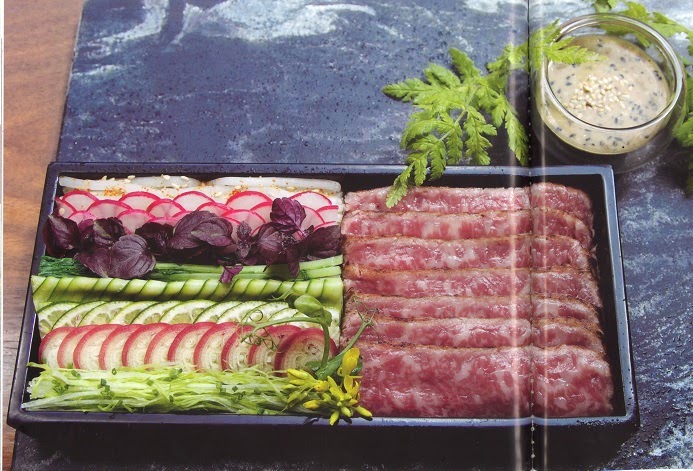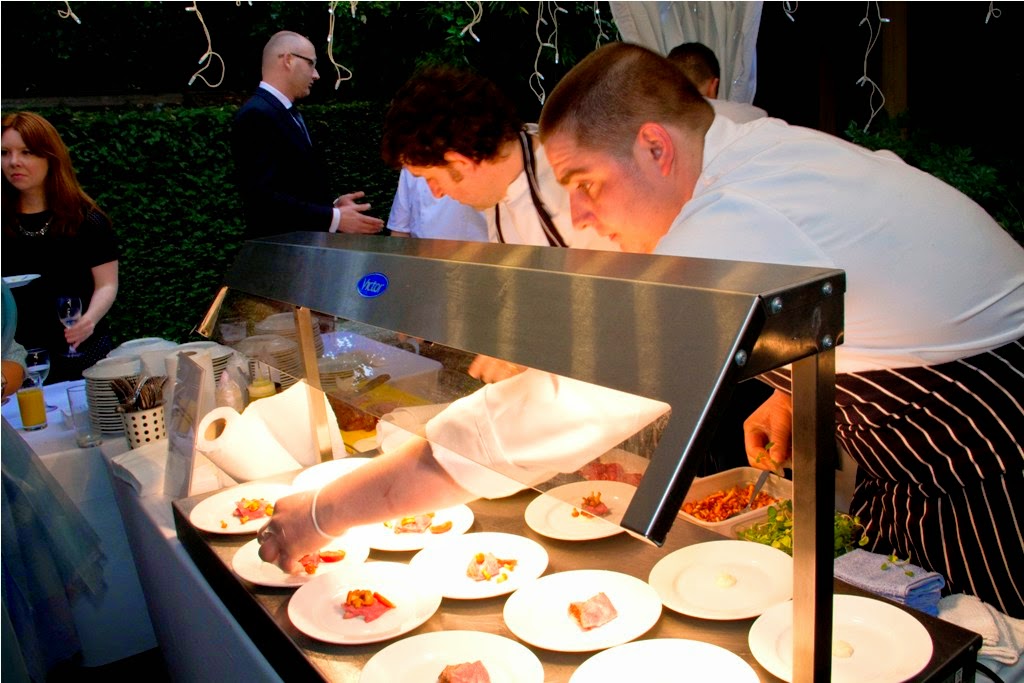
Despite that the season of wild salmon and elver ended early this month, I decided to join a charity project to release eel into nature hosted and invited by Dai, a leader of fishermen supplying mentioned fish to Umu and also a proprietor of salmon farming company.
 Elver caught in a net in early spring are
taken care of in fish preserves until grown healthfully until appropriate size,
which then are released to a lake in Wales, where eel is known to be extinct
due to excessive fishing by the landowner. The project, which had begun few
years back, already started showing positive results.
Elver caught in a net in early spring are
taken care of in fish preserves until grown healthfully until appropriate size,
which then are released to a lake in Wales, where eel is known to be extinct
due to excessive fishing by the landowner. The project, which had begun few
years back, already started showing positive results.
Regretfully Japanese eel has recently been
registered as an endangered species due to excessive fishing of both full-grown
and juvenile fish. Wild eel also continues to decrease in number around Europe,
yet few volunteers such as Dai’s organization devote to actualize concrete
plans to preserve the nature while sufficient number of larva still exist in
the wild. Moreover, strict regulations are casted upon eel fishing including
the elver fishing I once tagged along with Dai. The fishermen respect and
follow the regulation, and such approach teaches me many things, setting me an
example of a fisherman from an island nation. The contributions we can offer as
one restaurant is limited, thence being able to be a part of the project was a
privilege as well as a pleasure to us.
 In addition, since our head chef Masato
Nishihara, a friend of mine of 20 years’ standing who I lived under the same
roof with during my time at Kitcho, had instated the current position almost 3
years ago, we did not get an opportunity to have same off days due to our
respective roles. This time, upon many requests and invitations, we finally
grasped a rare chance to have a short trip together. We laughed and enjoyed the
whole trip, almost taking us back to 20 years ago when we used to visit
potteries and farmers as young minds.
In addition, since our head chef Masato
Nishihara, a friend of mine of 20 years’ standing who I lived under the same
roof with during my time at Kitcho, had instated the current position almost 3
years ago, we did not get an opportunity to have same off days due to our
respective roles. This time, upon many requests and invitations, we finally
grasped a rare chance to have a short trip together. We laughed and enjoyed the
whole trip, almost taking us back to 20 years ago when we used to visit
potteries and farmers as young minds. Left London at 1 a.m. after the dinner
service on Thursday and arrived at Dai’s home around 4 a.m. while it was still
dark around. Honey-coloured walls and straightly-lined roofs, the house had the
charm unique to the specific part of country. After a brief nap in the beds
that were readily made for us, we headed to Lake Llangorse in Wales by Dai’s
car.
Left London at 1 a.m. after the dinner
service on Thursday and arrived at Dai’s home around 4 a.m. while it was still
dark around. Honey-coloured walls and straightly-lined roofs, the house had the
charm unique to the specific part of country. After a brief nap in the beds
that were readily made for us, we headed to Lake Llangorse in Wales by Dai’s
car.
By the time we arrived at the lake, a team
of staff from Dai’s company, Severn & Wye Smokery, was busy preparing
set-ups for barbeque and eel larva for the main event. A group of children
arrived in coaches after a short while, who then enjoyed hot dogs we’d given
out before splitting onto a few boats and heading to the lake for releasing the
elver.

 We prepared Chirashi Sushi with eel and
salmon provided by the company while the kids were away for rough one hour and
a half. Preparing sushi for great number of people simultaneously is never
easy, especially with minimal equipment, yet I must say I relished contrasting
environment under the clear, blue sky.
We prepared Chirashi Sushi with eel and
salmon provided by the company while the kids were away for rough one hour and
a half. Preparing sushi for great number of people simultaneously is never
easy, especially with minimal equipment, yet I must say I relished contrasting
environment under the clear, blue sky.
The kids observed with amused eyes and
shot out many questions while Masato was handling the eel. The almost
transparently pure smiles and energetic laughter, along with simple words of
appreciations coming back from each one of the kids while we distributed
freshly made sushi, we felt our hearts being soothed.
After the children had departed, we were
invited onto the boats to go release remaining fish. My mood was lifted by
watching the baby fish swam freely into the wild of lake one by one, leaving me
somewhat uncannily refreshing feeling, as if it was I swimming into the nature.
The fishermen who helped at the event,
specializing in traditional salmon fishing, showed an interest to Ikejime
fish preserving technique I am extending around the UK, and as a consequent, I
demonstrated the method on the leftover salmon. Conversely, their specialized
miniature fishing boat had me smitten, and we promised to go fishing together
next spring when the season begins.
 Though
the hard schedule from the morning the day before had inevitably exhausted me,
I still manage to slip a nice dinner with game meat at a restaurant nearby
Dai’s home before I was fell into deep sleep
back in the room.
Though
the hard schedule from the morning the day before had inevitably exhausted me,
I still manage to slip a nice dinner with game meat at a restaurant nearby
Dai’s home before I was fell into deep sleep
back in the room.
Got up at 6 a.m. next morning and made our
way to Plymouth for the next event. On the way, we caught a glimpse of
beautiful Autumn-coloured Exmoor National park embraced in the morning mist.
 Arrived in Plymouth earlier than expected,
we managed to tour around the festival. The festival named “Japan 400
Plymouth”, celebrating the 400 years history of Anglo-Japanese relations, is
co-organized and supervised by the governments from the both ends and Plymouth
University. Ceremonial arrival of a sailing ship into the Sutton Harbour where
the first homecoming ship returned, a symposium held by recognized
intellectuals at the University, stage performances of Japanese drum Taiko
and Shamisen, and introductions to Japanese cuisine and Sake were on the
itinerary.
Arrived in Plymouth earlier than expected,
we managed to tour around the festival. The festival named “Japan 400
Plymouth”, celebrating the 400 years history of Anglo-Japanese relations, is
co-organized and supervised by the governments from the both ends and Plymouth
University. Ceremonial arrival of a sailing ship into the Sutton Harbour where
the first homecoming ship returned, a symposium held by recognized
intellectuals at the University, stage performances of Japanese drum Taiko
and Shamisen, and introductions to Japanese cuisine and Sake were on the
itinerary.  While waiting for my turn for the
presentation, I wandered through a port to conversed with local fishmongers and
fishermen. The small-scaled, traditional fishing is also practiced by a few
among them, and I believe many encounters would link to prospective supports in
the future.
While waiting for my turn for the
presentation, I wandered through a port to conversed with local fishmongers and
fishermen. The small-scaled, traditional fishing is also practiced by a few
among them, and I believe many encounters would link to prospective supports in
the future.
The presentations were presided by a
renowned chef Peter Gorton who recently endeavoring to nurture young chefs.
Following the introduction of Ikejime, demonstrated a preparation of
sashimi, and concluded with plentiful inquiries during Q&A session.
 To successfully return to the restaurant
by the dinner service, we ran through the whole 820miles/1320km journey back to
London. Masato surprisingly filled this entire trip with humorous stories, who
was always fast asleep every time on the passenger sheet for the last 20 years,
yet amused me again by dozing off right after we entered London off the highway
where I most needed a navigation. I truly enjoyed the trip to every last bit.
To successfully return to the restaurant
by the dinner service, we ran through the whole 820miles/1320km journey back to
London. Masato surprisingly filled this entire trip with humorous stories, who
was always fast asleep every time on the passenger sheet for the last 20 years,
yet amused me again by dozing off right after we entered London off the highway
where I most needed a navigation. I truly enjoyed the trip to every last bit.  今月初旬にシーズン終了となってしまいましたが当店で使っている天然鮭、ウナギの稚魚(Elver)の漁師の親玉であり、Faroe諸島で味の良い、健康的な鮭の養殖会社を経営しているDai氏からのかねてからのオファーで彼らの慈善事業の一つであるウナギの放流プロジェクトを手伝ってきました。
今月初旬にシーズン終了となってしまいましたが当店で使っている天然鮭、ウナギの稚魚(Elver)の漁師の親玉であり、Faroe諸島で味の良い、健康的な鮭の養殖会社を経営しているDai氏からのかねてからのオファーで彼らの慈善事業の一つであるウナギの放流プロジェクトを手伝ってきました。
彼らは春先に網で獲った稚ウナギを自社の生簀である程度の大きさになるまで育て、領主の乱獲により絶滅してしまったというWalesにある湖に数年前から計画的に放流し、既に成果を上げています。
残念ながら最近、日本では、成魚、稚魚ともに乱獲しすぎてしまったがゆえに日本ウナギは最近絶滅危惧種にまで指定されてしまいました。ヨーロッパウナギも減少の一途ではあるものの、まだまだ稚魚が自然界に十分存在するうちに彼らのようなボランティアが自然を守ろうと具体的に活動しています。以前Dai氏に同行させてもらったウナギの稚魚漁にしても厳しい漁業規制の中で常に自然界での絶対量をコントロールさせており、成魚漁も常に規制をかけています。漁師はそれを厳密に守っており、日本人として見習わなければならないことがたくさんあると感じます。いちレストランで出来ることは限られたことですが、彼らの素晴らしいプロジェクトを少しでもお手伝いができるということは私たちにとっても嬉しいことです。
吉兆時代から同じ釜の飯を食べていた20年来の付き合いがある西原理人が当店の料理長になってから3年間、お互いの立場上、一緒にお店を開けることができず、いつも休みは別の日にとっていましたが今回は各所からの要望もあり、やっとのことで彼との、短いながらも2人旅が実現しました。20年前、京都から休みを利用して陶芸家や農家を廻った昔にすっかり戻った気分で心の底から笑い、楽しむことができました。
 木曜日の営業をこなし、夜中の1時にロンドンを発し、まだ辺りは真っ暗な4時頃、Dai氏の家に着きました。Cotswoldsのはずれにある、この地方独特のはちみつ色の壁とスレートの屋根、とても趣のある素敵な家でした。用意してくれていたベットに直行、数時間の仮眠ののち、彼の車で ウェールズのLake Llangorseに向かいました。
木曜日の営業をこなし、夜中の1時にロンドンを発し、まだ辺りは真っ暗な4時頃、Dai氏の家に着きました。Cotswoldsのはずれにある、この地方独特のはちみつ色の壁とスレートの屋根、とても趣のある素敵な家でした。用意してくれていたベットに直行、数時間の仮眠ののち、彼の車で ウェールズのLake Llangorseに向かいました。
到着するとすでにDai氏の会社であるSevern & Wye smokery のスタッフがバーベキューや稚魚放流の準備を進めており、しばらくすると観光バスで児童たちが到着しました。彼らにホットドックを配った後、それぞれのボートに分乗し、湖にウナギを放流に行きました。
1時間半ほどで帰ってくるまでの間に、彼らの会社が提供してくれたウナギとサーモンを使ってちらし寿司を作りました。最小限の設備の中で 大人数分の寿司を作るのは大変でしたが、青空の下、いつもと違った雰囲気の中で楽しむことができました。
 理人がウナギを捌いたりしている間、子供たちは興味津々といった様子でいろいろなことを聞いてきます。出来上がったお寿司を配っているときもそうでしたが、子供は皆、透き通ったきれいな笑顔と元気な声、すべての子供から帰ってくるお礼の言葉など、こちらの方が心から癒されました。
理人がウナギを捌いたりしている間、子供たちは興味津々といった様子でいろいろなことを聞いてきます。出来上がったお寿司を配っているときもそうでしたが、子供は皆、透き通ったきれいな笑顔と元気な声、すべての子供から帰ってくるお礼の言葉など、こちらの方が心から癒されました。
子供たちが返った後、私たちがボートに招待され、残りの稚魚の放流をさせてもらえました。湖に向かって元気に泳ぎだす姿を一匹一匹見ていると私の気持ちが泳いでゆくような、不思議で爽やかな気持ちになりました。

イベントを手伝っていた鮭の伝統漁をしている人達が私が英国の漁師に広めている活けジメに非常に関心をもってくれ、残ったサーモンを使って彼らに目の前で活けジメの説明をしました。彼らの伝統漁で使っている特殊な超小型ボートの話は私も興味をもち、来春、シーズンが来たら必ず一緒に漁に行こうと約束をしました。
前日朝からの強行軍で正直疲れていましたが夜はDaik氏の家の近くのレストランで狩猟肉などを食べ、部屋に戻ってすぐに熟睡しました。
翌朝はまた6時に起き、次のイベントの目的地であるPlymouthに向かいました。道中、秋色になったExmoorナショナルパークは朝霧に包まれながらとてもきれいでした。

 Plymouthには思いのほか早く到着し、フィスティバルの様子を見ることができました。“Japan 400 Plymouth”と名付けられたこのイベントは英日両国の政府とPlymouth大学の企画のもと、日英交流が始まった400年前、最初の帆船が帰港したPlymouthでの記念行事で帆船の入港式、有識者による大学でのシンポジウム、和太鼓や三味線などのステージ、日本料理やお酒の紹介などが行われました。
Plymouthには思いのほか早く到着し、フィスティバルの様子を見ることができました。“Japan 400 Plymouth”と名付けられたこのイベントは英日両国の政府とPlymouth大学の企画のもと、日英交流が始まった400年前、最初の帆船が帰港したPlymouthでの記念行事で帆船の入港式、有識者による大学でのシンポジウム、和太鼓や三味線などのステージ、日本料理やお酒の紹介などが行われました。
私のプレゼンテーションまでには時間があったので港を回り、地元の漁師や魚屋といろいろと話ができました。彼らのなかにも伝統的な小規模の漁をする方がいて今後に結びつくいい出会いがたくさんありました。
プレゼンテーションは現在若手の料理人育成に尽力している著名シェフ、Peter Gortonの司会のもと、活けジメの紹介ののち、刺身を作り、多くの聴衆からの質問コーナーで締めくくられました。 翌朝はまた6時に起き、次のイベントの目的地であるPlymouthに向かいました。道中、秋色になったExmoorナショナルパークは朝霧に包まれながらとてもきれいでした。
翌朝はまた6時に起き、次のイベントの目的地であるPlymouthに向かいました。道中、秋色になったExmoorナショナルパークは朝霧に包まれながらとてもきれいでした。
Plymouthには思いのほか早く到着し、フィスティバルの様子を見ることができました。“Japan 400 Plymouth”と名付けられたこのイベントは英日両国の政府とPlymouth大学の企画のもと、日英交流が始まった400年前、最初の帆船が帰港したPlymouthでの記念行事で帆船の入港式、有識者による大学でのシンポジウム、和太鼓や三味線などのステージ、日本料理やお酒の紹介などが行われました。
私のプレゼンテーションまでには時間があったので港を回り、地元の漁師や魚屋といろいろと話ができました。彼らのなかにも伝統的な小規模の漁をする方がいて今後に結びつくいい出会いがたくさんありました。
プレゼンテーションは現在若手の料理人育成に尽力している著名シェフ、Peter Gortonの司会のもと、活けジメの紹介ののち、刺身を作り、多くの聴衆からの質問コーナーで締めくくられました。
夜の営業に間に合うようにロンドンに戻らなければならず、合計820マイル、1320kmの道のりを走破しました。20年前からいつも、どこへ行くときも私の助手席で眠っていた理人は今回の旅ではずっと楽しい話を続けていたかと思いきや、最もナビゲーションの必要な高速道路を下りてからのロンドン市内に入ると同時に眠りに落ちるという芸当も見せてくれ、楽しい旅となりました。






























